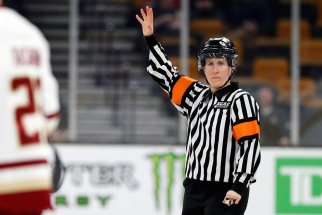Hockey takes important stride toward diversity
Read this article for free:
or
Already have an account? Log in here »
To continue reading, please subscribe:
Monthly Digital Subscription
$19 $0 for the first 4 weeks*
- Enjoy unlimited reading on winnipegfreepress.com
- Read the E-Edition, our digital replica newspaper
- Access News Break, our award-winning app
- Play interactive puzzles
*No charge for four weeks then billed as $19 plus GST every four weeks. Offer only available to new and qualified returning subscribers. Cancel any time.
Read unlimited articles for free today:
or
Already have an account? Log in here »
Hey there, time traveller!
This article was published 20/10/2021 (1161 days ago), so information in it may no longer be current.
On Oct. 16, Katie Guay made history as the first female referee to work a game in the American Hockey League, a professional tier one below the National Hockey League. She and her partner, referee Brandon Schrader, called 42 minutes in total penalties — 26 on the Lehigh Valley Phantoms, farm team of the NHL’s Philadelphia Flyers, and 17 on the Wilkes-Barre/Scranton Penguins, farm team of the Pittsburgh Penguins.
By all accounts, officiating was not an issue in the outcome of this game. The 39-year-old from Massachusetts, who had already officiated at the highest levels of men’s Canadian junior and U.S. college hockey, was praised for her fairness, skating and her ability to communicate with the players.
With Ms. Guay’s appearance, and the appearance of nine other female officials assigned to the AHL this season, the debate over the ability of women to officiate at the top levels of professional hockey should be put to rest. Regardless of whether they serve as head officials or linespeople, who are asked to intercede in physical disputes between players, women can do this job.

As encouraging as this story is, we should remember that professional hockey has lagged behind other sports in promoting female officials.
Both the National Basketball Association and the National Football League employ female officials. Of the “Big Four” professional sports, only Major League Baseball has a worse record than hockey on gender equality in officiating.
In 1991, professional umpire Pam Postema was released by MLB after seven seasons working AAA baseball, the highest level of minor-league baseball. Rarely do umpires work more than four years in the top tier of the minor-leagues, which are used specifically to develop talent for MLB. In 1991, she filed a sex-discrimination suit against MLB and settled out of court, on condition she not disclose the amount of money and, remarkably, that she wouldn’t apply for any umpiring jobs in any league affiliated with MLB.
What the AHL has finally come to understand is that increasingly, sports fans are not just concerned with on-ice or on-field performance. These days, fans are letting the stewards of professional sports know they are just as concerned about the behaviour and attitudes of players and team officials as they are about wins and losses.
What the AHL has finally come to understand is that increasingly, sports fans are not just concerned with on-ice or on-field performance.
Fans demand that professional athletes, as well as coaches, executives and owners, demonstrate some grasp of right and wrong. The business of sports has recognized this shifting paradigm and started to demonstrate a zero-tolerance for anyone guilty of criminal acts, including domestic violence, or behaviour that would qualify as racist, misogynistic or homophobic.
There are still incidents that go unpunished. But in response to fan sentiments, the rules used to police the games, and codes of conduct for players and team officials away from the fields of battle, have evolved to reflect a higher ideal of personal behaviour. Breaching them can result in banishment.
Promoting women to officiate in the AHL does not “fix” the problem of discrimination in sports. Women are still largely excluded from coaching or business roles. People of colour are still welcomed to join the ranks of athletes, but are often denied opportunities to coach, manage or own teams.
But Ms. Guay’s history-making game should serve as a reminder that progress is being made.








